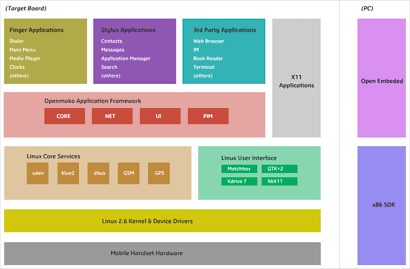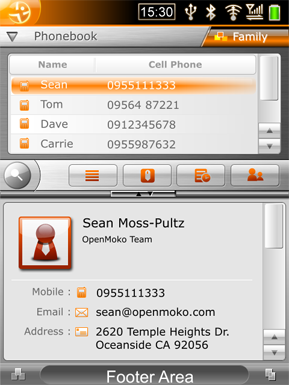iphone Killer May Come From Open Source Linux Phone…or Google
OpenMoko has released the developer version of its open platform cell phone called the Neo 1973. Neo 1973 is an homage to Marty Cooper who is credited with creating the first cell phone in 1973. $300 and its yours! (more for the full bore developer kit).
OpenMoko is a project to create a smartphone platform using free software. It uses the Linux Kernel, together with a graphical user environment built using the X.Org Server, GTK+ toolkit and the Matchbox window manager. The OpenEmbedded build framework and ipkg package system are used to create and maintain the software packages. OpenMoko is the platform created by FIC (First International Computer, Inc.) of Taiwan.
Here is a snapshot of the map:

The Neo 1973 boasts the following hardware specifications
- 2.8″ VGA TFT color display
- Touchscreen, usable with stylus or fingers
- 266MHz Samsung System on a Chip (SOC)
- USB 1.1, switchable between Client and Host (unpowered)
- Integrated AGPS
- 2.5G GSM – quad band, voice, CSD, GPRS
- Bluetooth 2.0
- Micro SD slot
- High Quality audio codec
Here is a sample of a working panel image:

Like what Make magazine says, “If you can’t open it, you don’t own it” which is pretty much the Penguin motto.
Now, that brings up Google.
Google has confirmed via at least one of their executives, that they have a cell phone in R&D. You may also recall that Google purchased Android back in 2005. Android made software for cell phones. One of the co-founders of Android was Andy Rubin of Danger fame and maker of the T-mobile Sidekick. Also in 2005, Google purchased a company called Skia which was a small company that focused on development of 2D graphics for mobile devices. Google also acquired ReqWireless, an organization specializing in browser and email software for mobile devices.
That’s a lot of Mobile App muscle and for what pray tell? With me so far?
In 2006, Google was awarded a patent for technology designed to make data on CDMA (Code Division Multiple Access) systems move faster. Thus, they now have technology to speed up data on phones and other mobile devices. In April 2006, Google was also granted a patent for voice-enabled search. That means users would be able to say out loud what they are looking for instead of typing it in. This functionality was tested for the PC in Google Labs.
When Eric Schmidt, Google Chief Executive, was asked back just this past April about intriguing technologies, he answered, “mobile, mobile, mobile.”
So, does that mean Google will actually manufacturer a phone? No. Does it mean Samsung might? It might. It also means that Google being Google is tapping into something anyone has yet to really smack their head and say, “Doh! Why didn’t I think of that”.
Now, granted. Apple is a LOOOOONNNNGGG way ahead of their competition. Their gear works out of the box with no fiddlin’. Amen to that, I says.
However, their could be some really cool and useful things the penguins with propellar caps might come up with that Apple can quickly emulate or kick out the door faster out of their own skunkworks. That’s all good for you and me.








